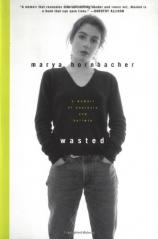Reading Group Guide
Discussion Questions
Wasted

1. In an interview with Elle magazine, Hornbacher said, "The book does not end with the end of the eating disorder, it ends with a turning point." How would you describe that "turning point"? What other turning points does the author describe in Wasted, and what were their outcomes?
2. To what extent do you think Hornbacher, at twenty-three, has achieved an understanding of her lifelong problem? Do you think she understands some areas and issues more fully than she does others? Are there any phenomena or implications of her eating disorders that she does not confront or understand?
3. Hornbacher writes that eating disorders are "a response, albeit a rather twisted one, to a culture, a family, a self." What personal (biological and psychological), familial, and cultural roots of anorexia and bulimia emerge from Hornbacher's history of her eighteen-year battle? What phenomena does she single out as being most significant?
4. In what ways does Hornbacher maintain and expand upon her main metaphor of a looking-glass world? What specifics of reversal and inversion give us a sense of an anorexic and bulimic young woman's world?
5. What role do secrecy and deceit play in the progression of eating disorders? How and why are bulimic and anorexic children so adept at concealing their behavior?
6. To what extent are anorexia and bulimia associated with a desire to control one's own self and the behavior of family members and acquaintances? To what extent do they spring from "a desire for power that strips you of all power" and a desire for personal autonomy?
7. Do you think that Hornbacher's frank account of her afflictions and other, similarly honest accounts foster an understanding of eating disorders and prevent other girls and young women from following in her footsteps? Or do they provide eating-disordered people guidance in how to "do it better"?
8. According to the National Association of Anorexia Nervosa and Associated Disorders, seven million girls and women in the United states have eating disorders. Why are anorexia and bulimia so overwhelmingly afflictions of young females? Why do so few young males fall victim to these disorders? Do boys and young men in our society suffer from different but corresponding disorders?
9. How well does Hornbacher combine her personal account with information from doctors, psychologists, and other authorities? Do the two sets of information consistently reinforce one another, or do they ever contradict one another?
10. How do anorexia and bulimia relate to the "cross-addictions" to sex, alcohol, and drugs? Does Hornbacher clarify the links among all these addictions?
11. Is Hornbacher justified in personalizing her disorder, as when she comments "You will never find a lover so careful, so attentive, so unconditionally present and concerned only with you"? To what extent does she view her disorder as a distinct other person or as a second self of Marya Hornbacher?
12. What physical and emotional scars does Hornbacher carry by the end of her account? What do those scars indicate about the nature and severity of her ordeal? What does her attitude toward them indicate about her ability to vanquish her disorder? Do you think that she will succeed in overcoming her "fascination with death"?
13. In what ways does Hornbacher present eating disorders as involving a conflict between "the female body" and "the female mind"? What is the nature of that conflict, and how does it manifest itself in anorexia and/or bulimia?
14. "People who've Been to Hell and Back," Hornbacher writes (p. 131), "develop a certain sort of self-righteousness." What sort of self-righteousness does she mean? How is it displayed by her former self? Does her book display any kind of self-righteousness?
15. Near the end of the book, Hornbacher writes, "I want to write a prescription for culture, . . . and I can't do that." (p. 283) To what extent, however, is her book a prescription for our present culture? What would be your "prescription for culture"?
Wasted
- Publication Date: January 15, 1999
- Paperback: 304 pages
- Publisher: Harper Perennial
- ISBN-10: 0060930934
- ISBN-13: 9780060930936







